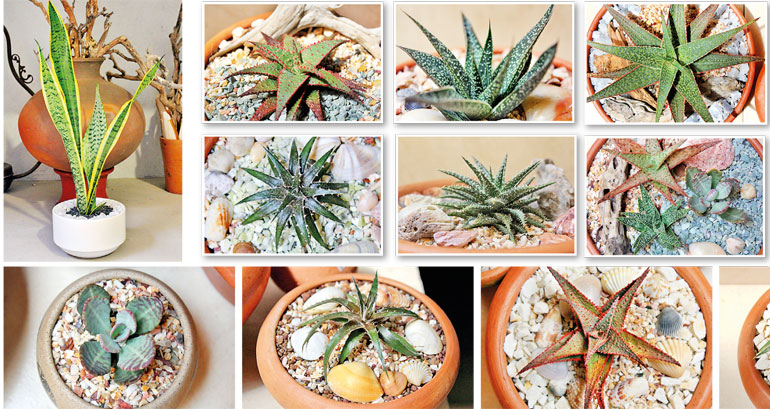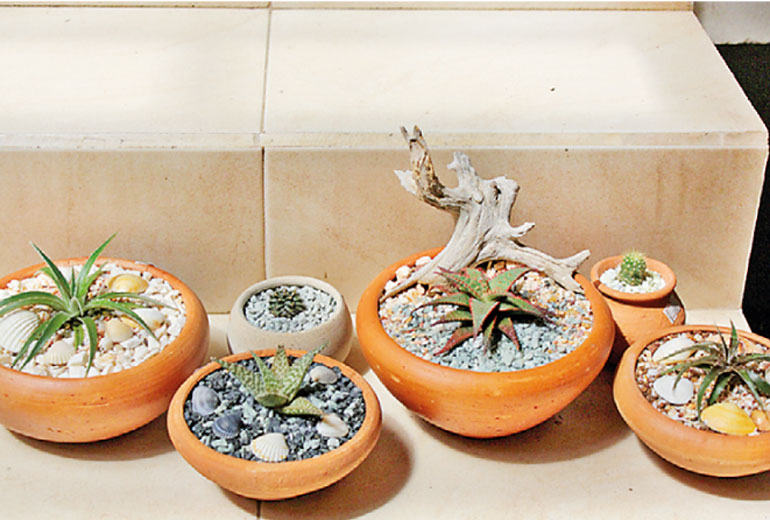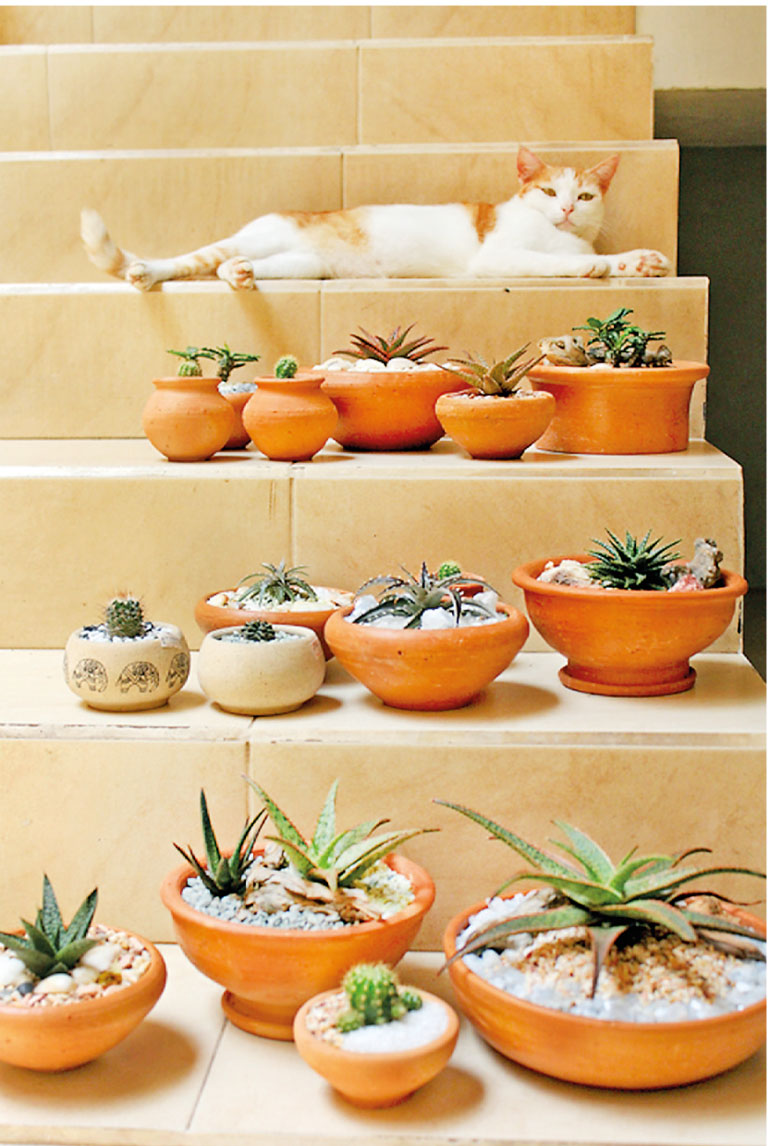Wednesday Mar 04, 2026
Wednesday Mar 04, 2026
Saturday, 10 December 2016 02:11 - - {{hitsCtrl.values.hits}}

Namal: We bring a little bit of nature to the spaces people live, work and play in, especially for those secret gardeners who don’t have garden space or time. We offer them a ‘garden in a pot’ which will grow with just a little bit of love and care. Our secret gardens are all-natural and bio-degradable – the plants, the soil mix, the décor and even the pot.
Namal: Our succulent plant collection was getting bigger and bigger and we were basically running out of space in the house. We found a few succulent enthusiasts in Sri Lanka and there seemed to be a niche for such specialty plants but we were not sure if that would be sufficient for a viable business. In Europe, more and more people have less and less garden space, so plants which you could keep indoors and do not need much space and maintenance are quite popular. Colombo seemed to be getting the same conditions. We thought there could be a viable market if we prepare them to fit such a purpose.
So we decided to give it a shot and see where it goes. We tried out Diyatha Uyana Market and then Good Market at Racecourse. Both have rates and terms which facilitate home-businesses-to-be like us to enter the market and try out before making long term high cost investments for store space. But it’s Good Market’s eco-friendly concept which inspired us to be ‘good to the planet’ not only because it is our responsibility, but also because it made good business sense. Our plants are naturally grown; we buy supplies from local producers, harvest rainwater and reduce-reuse-recycle as much as possible. We are not perfect at it yet, but that’s the goal.
Namal: Our specialty is desert plants such as hybrid Aloes, Dyckias, Cacti, Echeverias and similar succulent plants. Many people are familiar with the Aloe Vera with medicinal properties – that is one member of the Aloe family. The hybrid Aloes have different colours and textures and are usually smaller. The Dyckias from the pineapple family are spiky but beautiful with vibrant colours. The prickly Cacti are very hardy, while the Echeverias which grow easily in Nuwara Eliya need the most care in Colombo. We also have the more known indoor plants such as Sansevieria and ‘lucky plants’ which are recommended for their air-purification capacity.
Sascha: We also create our own hybrid Aloes through cross pollination. When plants flower, birds and butterflies mix the pollen from different plants when they go from flower to flower. The seeds produced from those flowers will produce plants that have the characteristics of both. I do the same thing, but I select the plants to cross according to colour or texture, to produce a new plant with a specific look.
I guess it’s a bit like painting a picture. It’s a long and tedious process because human fingers are not designed to do the same thing as butterfly feet (haven’t figured out how to train butterflies to do that yet), and sometimes many cycles have to be done to get the texture or colour you want, but once it is done it is your own plant creation, no one else in the world could create the same, and you even get to name it. I have done about 200 such hybrids now, and we sell some of those too, although I haven’t got around to naming all of them.

Namal: A lot of people buy them as home or office décor, or as gifts. They are also great for décor at cafes and restaurants. They do need some care but don’t need to be replaced like flowers. And they grow and purify the air. Our very first café customer was Café Kumbuk, followed by Kopi Kade. We had our first experience with events when two good friends ordered Aloes and Cacti planted in tiny clay pots to give their guests as wedding favours. What better gift for a wedding favour than one that will grow and keep memories alive?
Sascha: One reason I like these plants is that they look good by themselves. They do flower – but unlike many plants which look good only when in bloom, these plants look good all the time. So they are great for gifts and décor, and they are good for the environment. I hope people pick them because of that too.
Namal: It really varies. We try to offer something for everyone – for those who like tiny spiky, we have small Cacti. For those who like vibrant colours, there are the Aloes and Dyckias. For those who like something bigger and greener, there are the Sansevieria and lucky plants. We also do pots with combination of plants. Each plant is unique. So when you buy a pot from us it’s really one of a kind.
For pots, we use terracotta, ceramic, or concrete – no plastic. The décor for the pots are natural too – we use pretty pieces from nature like stones, pebbles, sea shells, twigs. We purchase up-cycled newspaper bags for packaging from a women’s community group. So what you get from Secret Garden is planet-friendly and guilt-free.
Sascha: Succulents are by nature slow growing plants. Most of our mother plants are from my original collection in Sri Lanka – around eight years old. The plants that we sell now are offsets from those or seedlings and are at least around two to three years old or more, although they don’t look that age!

Sascha: I have been growing succulents maybe for 20 years as a hobby. The hobby secret garden became the business ‘Secret Garden’ just about a year ago.
Sascha: I always liked plants and growing them. But in Germany where I come from, gardening is very hard work and in winter most outdoor plants will die and you need to re-plant in spring. I was working and did not have so much time, and my favourite plants were cacti and succulents. So I started a cacti collection which I could keep in my room. I could build up quite a collection as they don’t need much care or space.
When I moved to Sri Lanka and had some free time in between jobs, I started a new collection. The biggest challenge was to figure out what the plants needed according to local conditions. For example, the watering frequency that I used in Germany doesn’t work here, because here it is more humid. Also, the soil here is not very porous and stays moist – which is great for tropical plants, but not so good for succulents which prefer to stay dry between watering. So in the beginning it was a lot of research, trial and error and experimenting, and sometimes it was very frustrating! But, finally I could figure out a good all-natural soil mix, and the correct watering frequency.
My tip to aspiring gardeners is to do some research on the plants you want to grow, and get to know and understand your plants. They need love and care, just like people and animals, although maybe in lesser quantity! Gardeners in Sri Lanka are lucky, because you have ground and climate conditions for almost any plant to grow just by digging it in!
A: The type of care needed depends on the type of plant, and also the surrounding environment. Most of our plants are ‘desert plants’, so the main point is to control the water. Too much water is too bad for most of them. And, they don’t like humidity much. Generally, a small amount of water one to two times a week is enough. If it is an air-conditioned space, frequency might need to increase. And, during rainy periods once a week may be enough. We give all our customers a care instruction sheet, but the trick is to get to know and understand your plant a bit. A little bit of love will go a long way, even with plants!

A: At the moment our main point of sales is the Saturday Good Market at Racecourse, where people can check out and pick what they like. Customers can also order through FB, IG, and email, and pick up from our stall at Good Market. If there is a large order and if it is within Colombo, we drop them by personally as an extra service, but we can’t do that all the time because right now it’s only the both of us and we have to manage the time in between regular job and home business. Since the plants have to be handled with care and the pots are breakable, it is difficult to use normal courier services. But we are looking for a logistics solution for delivery not only in Sri Lanka but also internationally, which we need if we are to bring the business to the next level.
A: We have about 40-50 pots ready all the time, so if a customer is happy with any of those, they are immediately available. If someone wants something different and if the quantity is under 10 or so, just a day or two would do. We don’t keep a very large stock of pots so if a customer wants a big quantity then we need to check with the pot suppliers and work out a date. For things like wedding favours, when the quantity is like 200-300, we need about a couple of months’ notice, not only to get the pots but also to let the plants settle in the pots before delivery.
A: Next time you look for a gift, or décor for home or work, think about the planet, and pick something ‘good’.
